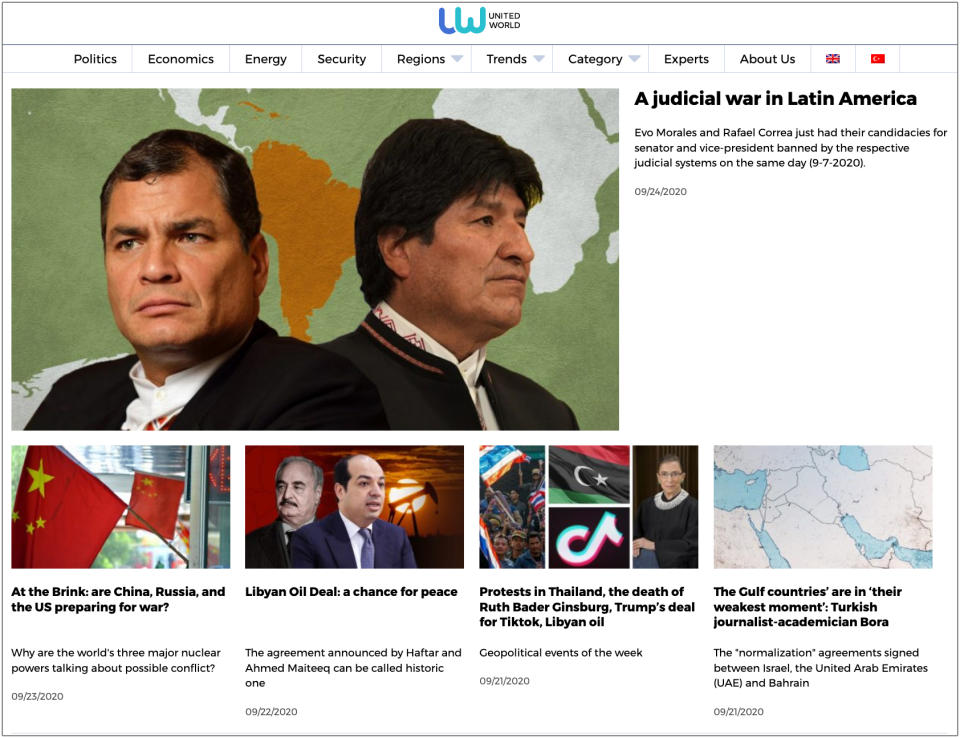Facebook and Twitter remove Russia-linked accounts linked to multiple agencies
Facebook said Thursday that it had removed accounts from three disinformation campaigns, each with at least loose ties to the Kremlin.
None of the three had a large following or were focused primarily on targeting Americans. But they shared similar tactics, and each came from a distinct Russia-linked agency, indicating the country's leadership is doubling down on building disinformation networks in the months before the U.S. election.
Facebook, Instagram and Twitter have since suspended the accounts that tried to cultivate followings to point users back to their websites. In each case, the number of accounts and their followers are a fraction of the size of similar campaigns that went viral in the lead-up to the 2016 election, indicating they’re being caught earlier.
While each was still in their infancy and didn’t display a clear intent, one possibility is that they would eventually be used to disseminated hacked information, in the way that Russia’s GRU used the Twitter and Wordpress persona Guccifer 2 and the website DCleaks to spread hacked Democratic National Committee files in 2016, according to Nathaniel Gleicher, Facebook’s head of cybersecurity policy.
“We don’t see specific evidence of an impending hack and leak, but hack and leak is an important risk we should be watching for in the weeks to come. These operations could pivot at any time,” Gleicher said.
Facebook said that one campaign, centered around a fake Turkish think tank, was linked to people who had been tied to the Internet Research Agency, or IRA, the Russian “troll factory” funded by Yevgeny Prigozhin, a close ally of Russian President Vladimir Putin. Like several takedowns of IRA-affiliated content, Facebook learned about it through a tip from the FBI.
Called United World International, or UWI, the account posted articles on contentious global affairs. Like another recently identified IRA-affiliate site called Peace Data, UWI presented itself as a legitimate entity that addressed controversial world news topics, and sought to hire legitimate freelance writers to make its content seem legit, with little success.

The second campaign, which the U.S. State Department previously attributed to Russia’s SVR intelligence agency, also created seemingly legitimate news sites, according to a study from the Atlantic Council, a Washington, D.C. think tank.
In broken English, the Oriental Review says: “Our mission, but sharing alternative outlooks and providing new edge analysis of the situation in the global ‘hot spots.’”
Another site created by the same actor, the Strategic Culture Foundation, presented itself as an international affairs journal. Much of it focused on pushing Russian foreign policy goals in neighboring states, like demeaning Ukraine and supporting Belarus President Alexander Lukashenko, a longtime Putin ally who has refused to step down after failing to hold a legitimate election, as well as U.S. topics.

The third entity, which a study from the social media analysis company Grapika found is tied to a Russian military entity, was more sprawling, and created social media accounts that linked to their own blog posts on sites like LiveJournal and Medium. Most of its content focused on Russia’s relationship with Asia, eastern Europe and Syria.
“If you’re measuring this against the type of operations they tried to run in 2016, they are not having the same impact,” Gleicher said. “This is a sign that the combination of automated enforcement and government cooperation are making it harder for these actors to go undetected."

